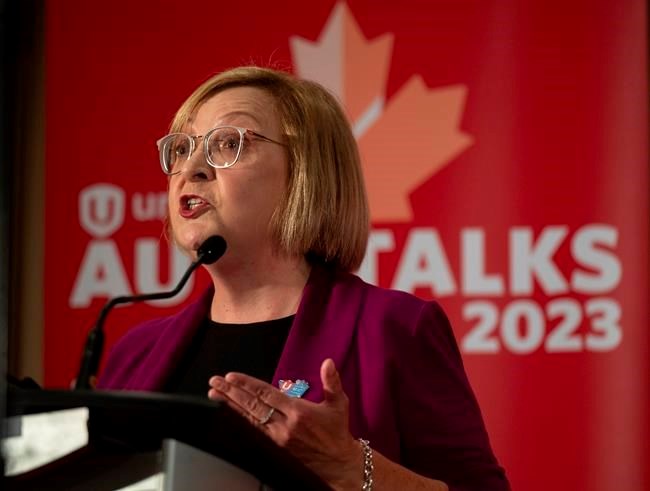TORONTO — The union representing workers at Ford Motor Co. facilities in Canada says its tentative deal with the company includes "transformative" gains, with one observer suggesting significant wage increases are likely.
Unifor and Ford reached a preliminary contract agreement late Tuesday night after extending a previous strike deadline by 24 hours.
“We believe that this tentative agreement, endorsed by the entire master bargaining committee, addresses all of the items raised by members in preparation for this round of collective bargaining,” Unifor national president Lana Payne said in a news release.
The three-year tentative deal covers more than 5,600 workers at Canadian Ford facilities. It includes members at Ford’s Oakville assembly plant, Annex and Essex engine plants in Windsor, Ont., along with its parts distribution centres in Brampton, Paris and Casselman in Ontario and in Leduc, Alta.
Key union leaders including Payne sent a message to union members touting the tentative agreement. "This painstaking work has resulted in fundamental, transformative gains that addressed our core priorities of pensions, wages and the EV transition," it reads.
Steven Tufts, an associate professor at York University, said he believes Payne wouldn't risk recommending an agreement unless Ford made a substantive offer.Â
"I think the wage increases are going to be significant in that deal," he said. "Payne probably made some inroads on the investments in EV transition ... and would be able to announce guaranteed investments for the transition to electric vehicles."
Tufts said the things to watch now are whether union rank-and-file will ratify the deal at a time when union workers have high expectations for bargaining gains and, crucially, if Payne can repeat any successes from the tentative agreement at GM and Stellantis.
Along with higher wages, the union had said the transition to electric vehicles and pensions and job security were key areas of focus during the bargaining process.
The formal negotiations between Unifor and the Detroit Three opened on Aug. 10 in Toronto — coming at a time when the rising cost of living and inflationary pressures continue to hamper financial security among Canadians.
The union then named Ford as its target for bargaining on Aug. 29, focusing on negotiations with that company to create a blueprint agreement to be used in talks with workers at General Motors and Stellantis.
The tentative agreement must still be ratified by union members.
“In addition to reaching a master agreement, our members at each Ford location face their own unique set of issues that needed to be resolved by our committees at the bargaining table,” Unifor Ford master bargaining chair John D’Agnolo said in a statement.
“This agreement makes the kind of gains our members need today and adds greater financial security for the future.”
The last round of Detroit Three contract negotiations in 2020 led to billions of dollars of investment commitments from the automakers. Unifor has said increased momentum on the transition to electric vehicles has brought total promised spending across all of Canada's auto sector to around $25 billion in the past three years.
Dennis Darby of the Canadian Manufacturers and Exporters welcomed the tentative agreement between Unifor and Ford.Â
"If it is accepted by workers, it will allow the Canadian automotive sector, but also the manufacturing sector more generally, to maintain their activities," he said in an emailed statement.Â
He said the current strike in the United States is having a significant effect on manufacturers, creating another headwind for an already slowing Canadian economy.
The tentative deal with Ford comes as U.S. autoworkers continue to strike against Ford as well as at General Motors and Stellantis plants.
South of the border, the United Auto Workers union entered the sixth day of the strike, with its union president Shawn Fain announcing a new strike deadline due on Friday. Fain has threatened to expand the strike across other plants if the Detroit Three doesn't make significant progress.
Tufts speculates that Ford came to an agreement with Unifor with a strategic goal of not having a strike in Canada, while lowering expectations on the deal in the U.S.Â
"Ford may have been incentivized to get a deal done without a strike in Canada as a means of dialing down the overall North American conflict," Tufts said.Â
This report by The Canadian Press was first published Sept. 20, 2023.
The Canadian Press




